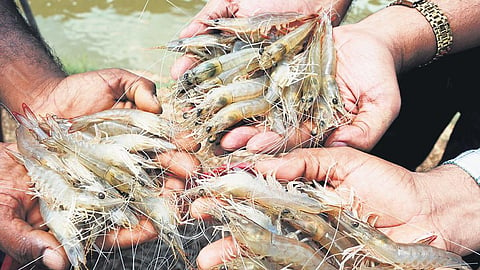

KOCHI: It is good news for the fishermen community and seafood exporters. After a four-year-long ban, the US administration is likely to lift the ban on Indian wild caught shrimp. A team of experts from the National Oceanic and Atmospheric Administration (NOAA), the scientific and regulatory agency of the United States Department of Commerce, will arrive in Kochi on February 19, to evaluate and grant final approval to the Turtle Excluder Device (TED) developed by the Kochi-based Central Institute of Fisheries Technology (CIFT).
The US administration had imposed a ban on Indian wild caught shrimp, alleging that the unregulated fishing activity was posing a threat to the endangered turtle species. If the US experts grant final approval to the TED, the coastal states will have to encourage the trawl boat owners to fix the new device. Once the fishing community accepts the innovation and the Ministry of Fisheries submits a compliance report, the US administration may lift the ban.
This will ensure better price for Indian shrimp in the international market ensuring better revenue for the fishermen. But the state governments will have to provide an incentive to the trawl boat operators to accept the innovation.
Sea turtles are listed as critically endangered or threatened on World Conservation Union Red List. Unregulated fishing poses a threat to the species as they get caught in trawl gears, pelagic long liners, gill net and shrimp trawl gears in coastal waters. A US law introduced in May 1996 restricted imports of shrimp harvested with fishing equipment such as trawl nets not equipped with TED.
“The new TED developed by CIFT meets the guidelines of the NOAA and we expect a final approval from US authorities during their visit on February 19. We have been conducting workshops in all coastal states to create awareness among the fishermen on the need to fix the TED in fishing gear. It will cost around Rs 25,000 and the state governments will have to provide some financial aid to the fishermen to fix the device in the net,” said CIFT director George Ninan.
“The previous design of TED was not following the NOAA standards and the US had banned Indian wild shrimp imports. We had a series of consultations with NOAA and finally developed a design according to their guidelines. Our scientists visited the US with the TED, which was evaluated by NOAA and this final design was approved,” said CIFT principal scientist V R Madhu.
The seafood export industry is excited about the visit of the NOAA experts and hopes that the ban will be withdrawn this time. “We had around 30 per cent share in the US wild caught shrimp market when the ban was imposed. Now we are exporting the species to Japan, China and European market. If the ban is lifted it will increase the demand and the price will soar. The industry, including export community, workers, trawl boat operators and fishermen will benefit from this,” said Seafood Exporters Association of India Kerala chapter president Alex Ninan.
“The fishing industry is in dire straits and around 30 per cent of boats have stopped venturing into the sea. If the new device will help to get better results we are ready to accept it. But the government should provide a subsidy to install it. As the device is heavy we will have to purchase new fishing gear and the operators are not in a position to afford the expense. Besides, the authorities should ensure that all coastal states implement the innovation,” said
All Kerala Fishing Boat Operators Association general secretary Joseph Xavier Kalappurackal.